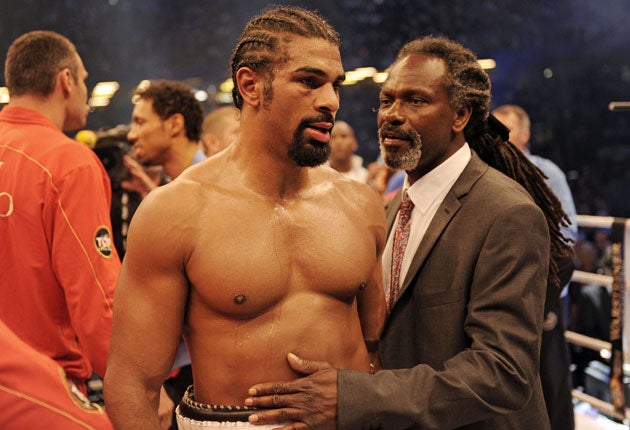James Lawton: Once the talking stopped, boxing's great charlatan was found lacking
Despite his talk, Haye could not lay a hand on Klitschko. He should leave us in peace

One of the surviving beauties of the ring is that nowhere on earth are you less likely to maintain a myth, especially when it is as grotesquely inflated as the one that carried David Haye to an estimated £15m pay night in Hamburg.
Predictably, Wladimir Klitschko removed Haye's credentials as a serious heavyweight contender, and still less a reigning world champion, as formally as a member of the Fraud Squad feeling a collar.
Haye pinpointed an injured toe as the reason for his profound failure to deliver even the beginnings of his promise to expose the "robotic" Klitschko.
Elsewhere, there must be another diagnosis when the worst of the hype dwindles to nothing more than an unfortunate memory for all those who made their contribution. It is that when the first bell sounded Haye faced a call to his heart and his nerve to which he was simply unable to respond.
The malevolent propagandist was thus inevitably exposed as the counterfeit heavyweight.
Before the fight which he had sold with trash talk of unprecedented tastelessness – and on the back of four heavyweight victories which were utterly lacking in any serious guidance as to how he might perform in anything vaguely resembling a legitimate examination of his credentials in a new division – Haye was entitled to a time-honoured benefit of the doubt.
His braggadocio and sneers were at least underpinned by a willingness to engage a heavyweight champion who, given these days of impoverishment, could be described as authentic. Bigger, stronger, deeply self-schooled in fighting to his strengths, which did not include the most shock-proof of chins, Klitschko represented a formidable challenge to a cruiserweight yet to face even the flimsiest examination.
The trouble was Haye simply wasn't up to it. He didn't have a fight plan – or if he did, it was one he was unable to operate coherently.
He delayed his entrance by 10 minutes but, long before the end of a deeply tedious fight, you had to wonder why he had bothered to turn up, other than to collect a paycheque which has to be seen as the last word in boxing inflation.
After scoring the fight overwhelmingly for Klitschko, the former fine world lightweight champion-turned-TV analyst Jim Watt offered the consolation that Haye would always be honoured as a world champion in two divisions.
What, you have to ask, is there to cherish in Haye's intervention in heavyweight affairs? Surely it is not four victories from the dregs of a division which once provided sport with its most compelling figure – and then something that didn't begin to pass for a challenge to the champion upon whom he had heaped so much scorn.
Nor a sustained assault on the belief that a heavyweight title, however easily gained, automatically imposed certain requirements on its holder; a modicum, of respect, perhaps, for fellow battlers in an unforgiving trade, and a sense that almost every public utterance should not be some nauseating insult to the intelligence of his audience. Give to Haye, certainly, his cruiserweight battle ribbons. But then dismiss the parade.
Dismiss, too, the idea that we are required to bury Haye's fighting heart on account of a wounded toe. If Haye believed it prevented him from fighting a decent fight and that he was condemned to the parody of one he produced in the Hamburg arena, his obligation, plainly, was to withdraw. But then that would have meant a financial rather than competitive disaster.
What we were left with from Haye were some hopeful lunges, and wearisome visits to the canvas which led an exasperated but errant referee, who had earlier docked a point from Klitschko for leaning in, imposing a spurious count for a phantom knockdown. Haye was, of course, right about Klitschko's cautious, robotic tendency and in the end he must have felt a degree of gratitude.
There were no prizes for deciding on Haye's best strategy. It was advocated by no less than Lennox Lewis and George Foreman – in the latter case presumably in one of his more lucid moments before announcing that, on his scorecard, the fight finished even.
Haye had to get inside Klitschko's long reach and relentless jab; he had to go to the mouth of the cannon. Instead, he fought a largely aimless fight at hopelessly long range.
He should forget about any fresh intrigues or confected drama. He might want to retract some of his most outrageous statements – he might even reflect that his legacy, such as it is, might be well served by a breath of humility, an admission that in the end found himself out of his depth – in and out of the ring. In any event, he should take his profits – and give us all a little peace.
Subscribe to Independent Premium to bookmark this article
Want to bookmark your favourite articles and stories to read or reference later? Start your Independent Premium subscription today.

Join our commenting forum
Join thought-provoking conversations, follow other Independent readers and see their replies